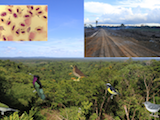Antoine Perrin PhD thesis
 Habitats fragmentation and host-parasite interactions
Habitats fragmentation and host-parasite interactions
Started in october 2017
Funding: école doctorale ES
Supervisors: Bruno Faivre and Stéphane Garnier
Abstract
Habitat fragmentation is one of the main threats to global biodiversity, and despite an abundant literature on the impact of fragmentation on species abundance and diversity, the consequences of this global change in terms of ecological and evolutionary processes remain poorly understood. Beyond their direct contribution to biodiversity, as species-rich category of organisms, parasites could be involved in biodiversity change as key actors of ecological and evolutionary processes. The present work aims to understand the effect of forest fragmentation on host-parasite interactions. It is based on a large sampling carried out in the Lesser Antilles and in French Guiana, and allowing the obtention of morphological, genetic and parasitological data for approximately 8000 forest birds from fifteen species.
Habitat fragmentation leads (i) to a reduction of the surface covered by this habitat (i.e., habitat loss) and (ii) to changes in the spatial configuration of the remaining habitat patches (i.e., habitat fragmentation per se). The specific objectives of this PhD thesis are, first, to understand the relative effect of these fragmentation components on host-parasite interactions at several organizational levels (individual, population and community); and second, to explore some ecological mechanisms (as host body condition and genetic diversity or apparent competition among hosts) potentially associated with these effects.
Forest fragmentation per se has a greater effect than forest loss on host-parasite interactions regardless of the organizational level studied. In addition, this PhD thesis shows that an increase in parasite prevalence in response to habitat fragmentation is associated (directly or indirectly) with a decrease in host body condition, a decrease in host neutral genetic diversity and changes in host immunogenetic diversity (depending on the studied locus), but also an increase in apparent competition between hosts. All together these relationships can increase our understanding of the current decline of wildlife diversity in response to the degradation and fragmentation of natural habitats.
Keywords
landscape structure, tropical forest, parasite prevalence, population genetics, ecological networks, apparent competition
Thesis advisory panel
Karen McCoy, IRD Montpellier
Jury
Élisa Thébault (Sorbonne Université) – reviewer
Philippe Christe (Université de Lausanne) – reviewer
Luc Barbaro (INRAE Occitanie-Toulouse) – examiner
Francis Raoul (Université Bourgogne Franche-Comté) – examiner
Bruno Faivre (Université Bourgogne Franche-Comté) – supervisor
Stéphane Garnier (Université Bourgogne Franche-Comté) – cosupervisor
- extrait:
- lien_externe:
- kc_data:
- a:8:{i:0;s:0:"";s:4:"mode";s:0:"";s:3:"css";s:0:"";s:9:"max_width";s:0:"";s:7:"classes";s:0:"";s:9:"thumbnail";s:0:"";s:9:"collapsed";s:0:"";s:9:"optimized";s:0:"";}
- kc_raw_content:
 Habitats fragmentation and host-parasite interactions
Habitats fragmentation and host-parasite interactionsStarted in october 2017
Funding: école doctorale ES
Supervisors: Bruno Faivre and Stéphane Garnier
Abstract
Habitat fragmentation is one of the main threats to global biodiversity, and despite an abundant literature on the impact of fragmentation on species abundance and diversity, the consequences of this global change in terms of ecological and evolutionary processes remain poorly understood. Beyond their direct contribution to biodiversity, as species-rich category of organisms, parasites could be involved in biodiversity change as key actors of ecological and evolutionary processes. The present work aims to understand the effect of forest fragmentation on host-parasite interactions. It is based on a large sampling carried out in the Lesser Antilles and in French Guiana, and allowing the obtention of morphological, genetic and parasitological data for approximately 8000 forest birds from fifteen species.
Habitat fragmentation leads (i) to a reduction of the surface covered by this habitat (i.e., habitat loss) and (ii) to changes in the spatial configuration of the remaining habitat patches (i.e., habitat fragmentation per se). The specific objectives of this PhD thesis are, first, to understand the relative effect of these fragmentation components on host-parasite interactions at several organizational levels (individual, population and community); and second, to explore some ecological mechanisms (as host body condition and genetic diversity or apparent competition among hosts) potentially associated with these effects.
Forest fragmentation per se has a greater effect than forest loss on host-parasite interactions regardless of the organizational level studied. In addition, this PhD thesis shows that an increase in parasite prevalence in response to habitat fragmentation is associated (directly or indirectly) with a decrease in host body condition, a decrease in host neutral genetic diversity and changes in host immunogenetic diversity (depending on the studied locus), but also an increase in apparent competition between hosts. All together these relationships can increase our understanding of the current decline of wildlife diversity in response to the degradation and fragmentation of natural habitats.
Keywords
landscape structure, tropical forest, parasite prevalence, population genetics, ecological networks, apparent competition
Thesis advisory panel
Karen McCoy, IRD Montpellier
Jury
Élisa Thébault (Sorbonne Université) - reviewer
Philippe Christe (Université de Lausanne) - reviewer
Luc Barbaro (INRAE Occitanie-Toulouse) - examiner
Francis Raoul (Université Bourgogne Franche-Comté) - examiner
Bruno Faivre (Université Bourgogne Franche-Comté) - supervisor
Stéphane Garnier (Université Bourgogne Franche-Comté) - cosupervisor
